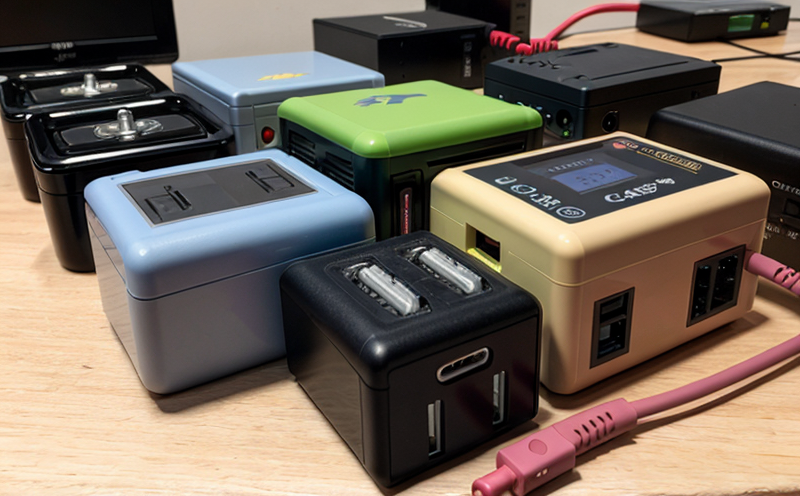Toxic Substance Testing in Batteries
Toxic substance testing in batteries is a critical process that ensures consumer safety and compliance with international standards. The presence of toxic substances such as lead, mercury, cadmium, or lithium can pose significant health risks if they leach out from the battery during its lifecycle. This service involves comprehensive analysis to identify and quantify these harmful elements within various types of batteries.
Batteries are essential components in numerous consumer products ranging from mobile phones and laptops to electric vehicles and medical devices. The environmental, health, and safety (EHS) concerns associated with batteries have driven the development of rigorous testing protocols aimed at minimizing risks. Compliance with standards like ISO 17940-2 for lithium-ion batteries or ASTM F3568 on battery chemistry is crucial.
The testing process begins with careful sampling and preparation of the battery specimens. This includes disassembly, extraction, and purification to isolate the target toxic elements from the matrix. Once prepared, these samples are analyzed using advanced techniques such as inductively coupled plasma mass spectrometry (ICP-MS) or atomic absorption spectroscopy (AAS). These methods provide high sensitivity and accuracy necessary for detecting trace amounts of harmful substances.
Testing laboratories equipped with state-of-the-art instrumentation ensure precise measurement and reliable results. The data collected from these analyses are used to assess whether the battery meets regulatory requirements set by organizations like the European Union's REACH regulation or the California Proposition 65 list.
The importance of this testing cannot be overstated, especially considering the increasing demand for safer and more sustainable electronics. By identifying and mitigating potential hazards early in the product development cycle, manufacturers can avoid costly recalls and reputational damage. Moreover, compliance with international standards helps businesses navigate complex regulatory landscapes across different markets.
In summary, toxic substance testing in batteries plays a vital role in safeguarding public health while promoting environmentally friendly practices within the electronics industry. It serves as an indispensable tool for quality managers, compliance officers, R&D engineers, and procurement teams seeking to ensure their products meet stringent safety standards.
Why It Matters
The significance of toxic substance testing in batteries extends beyond mere compliance; it directly impacts human health, environmental protection, and consumer trust. Regulatory bodies worldwide have implemented strict guidelines to control the release of harmful substances from batteries into the environment or through use.
For instance, the European Union's Restriction of Hazardous Substances (RoHS) directive prohibits the presence of certain heavy metals like lead, mercury, cadmium, and hexavalent chromium in electronics. Similarly, the California Air Resources Board (CARB)'s Proposition 65 requires manufacturers to provide warnings if their products contain chemicals known to cause cancer or reproductive toxicity.
These regulations not only protect consumers but also encourage innovation towards greener alternatives. By adhering to these standards, companies demonstrate their commitment to sustainability and responsible manufacturing practices. This can enhance brand reputation and foster long-term relationships with environmentally conscious customers.
From a broader perspective, reducing the environmental footprint of batteries contributes significantly to global efforts against climate change. The lifecycle assessment (LCA) of batteries reveals that minimizing toxic emissions at every stage—from raw material extraction to end-of-life disposal—can lead to substantial reductions in greenhouse gas emissions and waste generation.
The impact on public health is equally profound. Exposure to toxic substances from improperly disposed or poorly designed batteries can lead to various illnesses, including neurological disorders, respiratory issues, and cancers. Ensuring that these elements do not migrate into the ecosystem strengthens our collective efforts towards a healthier planet for future generations.
Benefits
The benefits of toxic substance testing in batteries transcend compliance requirements; they offer tangible advantages to businesses operating in this sector. First and foremost, conducting thorough analyses helps manufacturers identify any unintended contamination early in the production process. This proactive approach allows for corrective actions before products reach the market, thereby avoiding costly recalls and potential legal disputes.
Moreover, adherence to strict testing protocols enhances customer satisfaction by delivering safer, more reliable products. In today's competitive marketplace, where consumer trust is paramount, companies that prioritize safety earn a competitive edge. Such practices also contribute positively to brand image and reputation, fostering loyalty among environmentally conscious consumers.
Beyond immediate benefits, toxic substance testing in batteries plays an essential role in driving technological advancements. By pushing the boundaries of current knowledge and capabilities, this service fosters innovation within the industry. For example, research into safer battery chemistries or improved recycling technologies is spurred by insights gained from such tests.
Additionally, complying with stringent international standards positions companies favorably for expansion into new markets. As regulations continue to evolve globally, maintaining a high standard of quality ensures smooth entry and operation in diverse jurisdictions. This not only opens up opportunities for growth but also strengthens partnerships with international clients who value responsible business practices.





